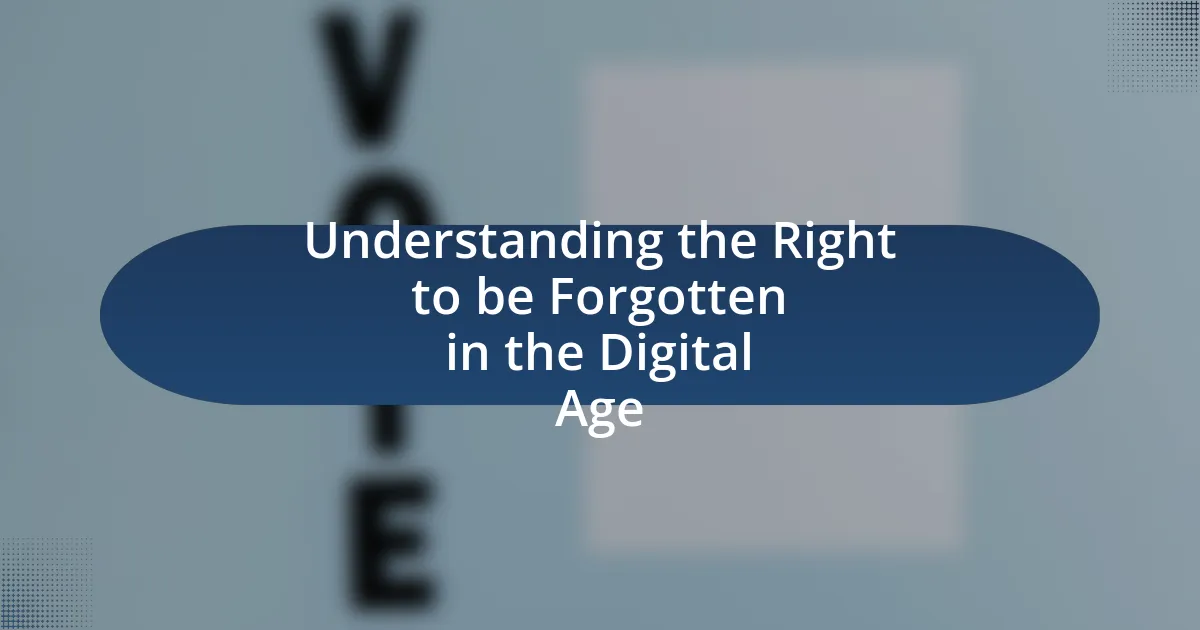Blockchain technology significantly enhances digital privacy through its decentralized data storage and cryptographic security measures. By distributing data across a network, it reduces the risk of data breaches and unauthorized access, while cryptographic techniques protect user identities and transaction details. The article explores the fundamental principles of blockchain, including decentralization, transparency, immutability, and security, and discusses how these features contribute to improved digital privacy. It also addresses the importance of digital privacy in today’s world, the risks associated with poor privacy measures, and the challenges of implementing blockchain solutions. Additionally, the article highlights emerging trends and best practices for individuals to enhance their digital privacy using blockchain technology.

How can blockchain technology enhance digital privacy?
Blockchain technology enhances digital privacy by enabling decentralized data storage and cryptographic security measures. This decentralized approach ensures that personal data is not stored in a single location, reducing the risk of data breaches and unauthorized access. Additionally, blockchain employs cryptographic techniques such as hashing and encryption, which protect user identities and transaction details from being easily deciphered. For instance, in a study by the University of Cambridge, researchers found that blockchain’s immutable ledger can provide users with greater control over their personal information, allowing them to share only what is necessary while keeping the rest private. This combination of decentralization and cryptography fundamentally strengthens digital privacy in online interactions.
What are the fundamental principles of blockchain technology?
The fundamental principles of blockchain technology are decentralization, transparency, immutability, and security. Decentralization ensures that no single entity controls the entire network, allowing for distributed consensus among participants. Transparency allows all transactions to be visible to network participants, fostering trust. Immutability means that once data is recorded on the blockchain, it cannot be altered or deleted, ensuring the integrity of the information. Security is achieved through cryptographic techniques that protect data from unauthorized access and fraud. These principles collectively enhance digital privacy by providing a secure and transparent framework for transactions.
How does decentralization contribute to privacy in blockchain?
Decentralization enhances privacy in blockchain by distributing data across a network of nodes rather than storing it in a single location. This distribution makes it significantly harder for any single entity to access or control all the data, thereby reducing the risk of data breaches and unauthorized surveillance. For instance, in a decentralized blockchain, user identities and transaction details are often pseudonymous, meaning they are not directly linked to personal information, which further protects user privacy. Additionally, the use of cryptographic techniques in decentralized systems ensures that even if data is intercepted, it remains unreadable without the appropriate keys, reinforcing privacy.
What role does encryption play in securing data on the blockchain?
Encryption plays a critical role in securing data on the blockchain by ensuring that information is protected from unauthorized access and tampering. It achieves this through cryptographic algorithms that convert data into a format that is unreadable without the appropriate decryption key. For instance, public-key cryptography allows users to generate a pair of keys—one public and one private—where the public key encrypts data and the private key decrypts it, thus maintaining confidentiality and integrity. This method is foundational in blockchain technology, as it not only secures transactions but also verifies the identities of participants, preventing fraud and ensuring trust in the system.
Why is digital privacy important in today’s world?
Digital privacy is crucial in today’s world because it protects individuals’ personal information from unauthorized access and misuse. With the rise of digital technologies, data breaches and identity theft have become prevalent, affecting millions of people annually. According to a report by Cybersecurity Ventures, cybercrime is projected to cost the world $10.5 trillion annually by 2025, highlighting the urgent need for robust digital privacy measures. Furthermore, digital privacy is essential for maintaining trust in online services, as users are more likely to engage with platforms that prioritize their data security.
What are the risks associated with poor digital privacy?
Poor digital privacy exposes individuals and organizations to significant risks, including identity theft, financial loss, and unauthorized access to sensitive information. Identity theft can occur when personal data is compromised, leading to fraudulent activities that can damage credit scores and financial stability. Financial loss is a direct consequence of cyberattacks, with the global cost of cybercrime projected to reach $10.5 trillion annually by 2025, according to Cybersecurity Ventures. Additionally, unauthorized access to sensitive information can result in data breaches, which affect millions of users and can lead to legal repercussions for organizations. These risks highlight the critical need for robust digital privacy measures to protect personal and organizational data.
How do current privacy concerns affect individuals and organizations?
Current privacy concerns significantly impact individuals and organizations by increasing the demand for data protection and compliance with regulations. Individuals face risks such as identity theft and unauthorized data access, leading to a heightened awareness of personal data security. Organizations, on the other hand, must navigate complex legal frameworks like the General Data Protection Regulation (GDPR), which imposes strict penalties for non-compliance, thus influencing their operational strategies and data management practices. For instance, a study by the Ponemon Institute found that the average cost of a data breach is $3.86 million, underscoring the financial implications of inadequate privacy measures.
What specific features of blockchain enhance digital privacy?
Blockchain enhances digital privacy through features such as decentralization, cryptographic security, and pseudonymity. Decentralization ensures that no single entity controls the data, reducing the risk of data breaches and unauthorized access. Cryptographic security employs algorithms to encrypt data, making it accessible only to authorized users and protecting it from tampering. Pseudonymity allows users to interact on the blockchain without revealing their real identities, thus safeguarding personal information. These features collectively contribute to a more secure and private digital environment, as evidenced by the increasing adoption of blockchain in sectors like finance and healthcare, where data privacy is paramount.
How does pseudonymity work in blockchain transactions?
Pseudonymity in blockchain transactions allows users to engage in financial activities without revealing their real identities. Each participant is represented by a unique cryptographic address, which does not directly link to personal information. This structure enables transactions to be conducted anonymously while still being recorded on a public ledger, ensuring transparency and security. The pseudonymous nature of blockchain is reinforced by the fact that while transaction histories are visible, the identities behind the addresses remain obscured unless voluntarily disclosed. This mechanism supports privacy by allowing users to transact without exposing their personal data, thus enhancing digital privacy in the blockchain ecosystem.
What is the significance of smart contracts in protecting user data?
Smart contracts are significant in protecting user data by automating and enforcing agreements without the need for intermediaries, thereby reducing the risk of data breaches. They operate on blockchain technology, which ensures that data is stored in a decentralized manner, making it less vulnerable to unauthorized access. For instance, smart contracts can stipulate conditions under which data can be accessed or shared, ensuring that user consent is always respected. This is supported by the fact that blockchain’s immutable ledger records all transactions transparently, allowing users to verify how their data is used.
How does blockchain technology compare to traditional privacy solutions?
Blockchain technology offers a decentralized approach to privacy that contrasts sharply with traditional privacy solutions, which often rely on centralized control. In blockchain systems, data is encrypted and distributed across a network, making it inherently more secure against unauthorized access and data breaches. Traditional privacy solutions, such as centralized databases, are vulnerable to single points of failure and hacking incidents, as evidenced by numerous high-profile data breaches affecting companies like Equifax and Target. Furthermore, blockchain enables users to maintain control over their personal data through cryptographic keys, allowing for selective sharing without compromising overall privacy. This level of user empowerment is not typically available in traditional systems, where users often relinquish control of their data to service providers.
What are the limitations of conventional privacy methods?
Conventional privacy methods often fail to provide adequate protection against data breaches and unauthorized access. These methods typically rely on centralized systems, which are vulnerable to hacking and data leaks, as evidenced by numerous high-profile breaches in recent years, such as the Equifax breach in 2017 that exposed sensitive information of 147 million people. Additionally, conventional methods often require users to trust third-party entities to manage their data, leading to potential misuse or mishandling of personal information. Furthermore, many conventional privacy techniques, such as encryption, can be circumvented by advanced cyber threats, highlighting their limitations in ensuring comprehensive privacy.
How does blockchain address these limitations effectively?
Blockchain effectively addresses limitations in digital privacy by providing a decentralized and immutable ledger that enhances data security and user control. This technology allows individuals to own and manage their personal data without relying on centralized entities, reducing the risk of data breaches and unauthorized access. For instance, blockchain’s cryptographic techniques ensure that data is encrypted and only accessible to authorized parties, thereby safeguarding sensitive information. Additionally, the transparency of blockchain allows users to verify transactions and data usage, fostering trust and accountability. According to a study by the World Economic Forum, blockchain can significantly reduce the risk of identity theft and fraud, demonstrating its effectiveness in enhancing digital privacy.
What are the challenges of implementing blockchain for digital privacy?
The challenges of implementing blockchain for digital privacy include scalability issues, data immutability, and regulatory compliance. Scalability concerns arise because blockchain networks can struggle to handle a high volume of transactions efficiently, which can hinder user experience and privacy. Data immutability presents a challenge as once information is recorded on the blockchain, it cannot be altered or deleted, potentially exposing sensitive data permanently. Regulatory compliance is complicated by the decentralized nature of blockchain, making it difficult to adhere to privacy laws such as the General Data Protection Regulation (GDPR), which requires the ability to erase personal data upon request. These factors collectively complicate the effective integration of blockchain technology into systems designed to enhance digital privacy.
What technical hurdles must be overcome for widespread adoption?
Widespread adoption of blockchain technology for enhancing digital privacy requires overcoming several technical hurdles, including scalability, interoperability, and regulatory compliance. Scalability issues arise because many blockchain networks struggle to process a high volume of transactions quickly, which can hinder user experience and limit adoption; for instance, Bitcoin can handle only about seven transactions per second, while traditional payment systems like Visa can process thousands. Interoperability challenges exist as different blockchain platforms often operate in silos, making it difficult for users to transfer assets or data seamlessly across networks; this lack of standardization can impede the integration of blockchain solutions into existing systems. Lastly, regulatory compliance is crucial, as varying legal frameworks across jurisdictions can create uncertainty for businesses looking to implement blockchain solutions, potentially stalling innovation and adoption.
How do regulatory issues impact the use of blockchain for privacy?
Regulatory issues significantly impact the use of blockchain for privacy by imposing compliance requirements that can limit the effectiveness of privacy features. For instance, regulations such as the General Data Protection Regulation (GDPR) in Europe mandate data erasure and user consent, which can conflict with blockchain’s immutable nature. This creates challenges for organizations seeking to leverage blockchain for privacy, as they must navigate the tension between regulatory compliance and the fundamental characteristics of blockchain technology. Additionally, regulatory scrutiny can lead to increased costs and complexity in implementing privacy-focused blockchain solutions, potentially stifling innovation in this area.
What are the future prospects of blockchain in enhancing digital privacy?
The future prospects of blockchain in enhancing digital privacy are significant, as the technology offers decentralized data management that can empower users with greater control over their personal information. Blockchain’s inherent characteristics, such as immutability and transparency, enable secure transactions without the need for intermediaries, reducing the risk of data breaches. For instance, projects like SelfKey and Civic utilize blockchain to provide users with self-sovereign identity solutions, allowing individuals to manage their identities and share only necessary information with service providers. Additionally, advancements in privacy-focused blockchain protocols, such as Zcash and Monero, demonstrate the potential for enhanced anonymity in transactions, further protecting user data. These developments indicate a strong trajectory for blockchain technology in reinforcing digital privacy measures in the coming years.
How might emerging technologies integrate with blockchain for better privacy?
Emerging technologies can integrate with blockchain to enhance privacy by utilizing advanced cryptographic techniques and decentralized identity solutions. For instance, zero-knowledge proofs allow one party to prove to another that a statement is true without revealing any additional information, thereby maintaining user privacy while still validating transactions on the blockchain. Additionally, the use of decentralized identifiers (DIDs) enables individuals to control their personal data without relying on centralized authorities, further protecting their privacy. Research indicates that combining these technologies can significantly reduce the risk of data breaches and unauthorized access, as evidenced by projects like Zcash and the Sovrin Network, which implement these privacy-preserving methods effectively.
What trends should we watch for in the evolution of blockchain privacy solutions?
Emerging trends in blockchain privacy solutions include the development of zero-knowledge proofs, enhanced privacy coins, and regulatory compliance mechanisms. Zero-knowledge proofs allow one party to prove knowledge of a fact without revealing the fact itself, which is increasingly being integrated into blockchain protocols to enhance user privacy. Privacy coins like Monero and Zcash are gaining traction as they offer advanced obfuscation techniques to protect transaction details. Additionally, as governments and regulatory bodies focus on data privacy, blockchain solutions are evolving to incorporate compliance features that balance privacy with legal requirements, ensuring that users can maintain anonymity while adhering to regulations. These trends reflect a growing emphasis on user control over personal data and the need for secure, private transactions in the digital landscape.
What best practices can individuals adopt to enhance their digital privacy using blockchain?
Individuals can enhance their digital privacy using blockchain by employing practices such as utilizing decentralized applications (dApps), opting for privacy-focused cryptocurrencies, and managing their private keys securely. Decentralized applications minimize reliance on centralized servers, reducing the risk of data breaches. Privacy-focused cryptocurrencies, like Monero and Zcash, offer enhanced anonymity features that obscure transaction details. Furthermore, securely managing private keys ensures that individuals maintain control over their digital assets and personal information, preventing unauthorized access. These practices collectively contribute to a more private and secure digital experience, aligning with the inherent privacy features of blockchain technology.





